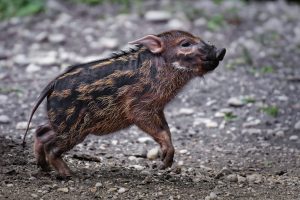Amid the COVID-19 pandemic, India’s northeast states have been hit by another lethal virus believed to have come to the region from China, which has affected only pigs in the frontier zones of the country.
The African Swine Fever (ASF) has killed more than 14,000 pigs in the border state of Assam alone, prompting the other states in the region to sound a red alert.
The virus is believed to have spread from the thousands of carcasses that floated down the tributaries of Brahmaputra river originating in China. According to media reports, carcasses have been spotted as far as Tezpur and Jorhat in Assam, located hundreds of miles from the Line of Actual Control (LAC) that separates India from China.
In most cases, infected pigs died within two to seven days after showing symptoms, like breathing problems, dysentery, high fever, unconsciousness, and vomiting.
Assam’s pig population is estimated at over 2 million, including wild boars. The government has identified five vulnerable districts in the eastern region of the state with orders to prevent the movement of domestic pigs and their intermingling with wild boards. A two-kilometer-long and six-foot-deep trench has also been dug at the World Heritage Site of Kaziranga National Park to protect wild boars from ASF infection.
ASF is a viral disease that affects wild and domestic pigs with a case fatality rate (CFR) of about 100 percent. It is transmitted through direct contact with an infected or wild pig and indirect contact through the ingestion of contaminated material or through biological vectors such as ticks. ASF is different from Classical Swine Fever (CSF), whose symptoms could be similar to ASF, but is caused by a different virus.
The first outbreak of ASF was confirmed in China in August 2018. Subsequently, outbreaks have been reported in Mongolia, Vietnam, Cambodia, Myanmar, the Philippines, Republic of Korea, and Indonesia, as per an update issued by the UN Food and Agriculture Organisation (FAO).
The outbreak in India’s northeast came months after the central agriculture ministry issued a warning on ASF to all the state governments in the country. A notification dispatched on June 10, 2019, said that ASF “is a matter of concern for India as there is movement of both live pigs and pork products into India from its neighboring countries.”
The advisory also said, “The border Indian states need to remain alert on the movement of live pigs and pork products into their territory. In this regard, the people in the border areas, especially in the northeast, require to be adequately sensitised.”
The outbreak of ASF comes at a time when the Indian economy is reeling under a severe strain like other countries due to the COVID-19-induced lockdown, which has been partially lifted. The country’s northeast is among the most underdeveloped regions, with a per capita income far below that of other states in the country.
The consumption of pork is high in India’s northeast, where pig farming is also a source of livelihood for thousands of farmers across all the states. The region consumes as much as 75 percent of pork produced in the country.
After the outbreak in Assam, all the northeastern states in India have asked people, especially owners of pig farms, to abstain from transporting pigs from other states. It is estimated that about 60 percent of the annual pork demand of the region is met by imports from the mainland states in India, such as Bihar, Uttar Pradesh, and Punjab.
The Meghalaya government has already banned the transportation of pigs from outside the state. In Arunachal Pradesh, the consumption of pork has been banned after reports were received from the Bhopal-based National Institute of High Security Animal Diseases (NIHSAD) on samples sent from ten districts in the hill state.
Rajeev Bhattacharyya is a senior journalist in Assam, India.

































